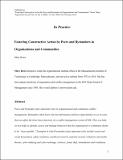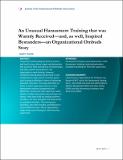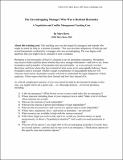2. Bystanders
In the articles below, the term “bystander” is used for people who observe or come to know about the behavior of others (whether unacceptable or exemplary behavior), but who are not knowingly engaged in planning or executing that behavior.
Many bystanders hesitate to act—for many different reasons discussed in these articles. Some reasons are helpful and responsible, but many bystanders need and want safe, accessible, and credible support before they can and will act.
Recent Submissions
-
Fostering Constructive Action by Peers and Bystanders in Organizations and Communities
(Negotiation Journal, 2018-04) -
An Unusual Harassment Training That Was Warmly Received—and, as well, Inspired Bystanders—an Organizational Ombuds Story
(Journal of the International Ombuds Association, 2025-04)Harassment and bullying are hard to endure and hard to stop. Many targets and bystanders fear to ask for help, fearing loss of relationships and other painful consequences. All organizations need training. However, sensitivity ... -
The Eavesdropping Manager Who Was a Hesitant Bystander
(MIT Sloan School of Management website, 2024-02)


